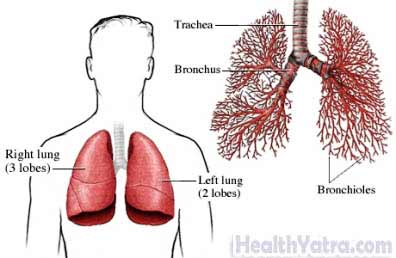Definition
Air passes to the lungs through airways called bronchi. Bronchitis is the swelling of the bronchi. It can make breathing difficult.

There are different types of bronchitis such as:
- Acute bronchitis—This is a sudden onset of symptoms. It only lasts a short time and lung function is fully recovered.
- Chronic bronchitis—This is a serious, long-term condition. It causes blockage and damage of the lungs. It is often the result of many years of cigarette smoking.
This fact sheet focuses on acute bronchitis.
Causes
The swelling in the bronchi may be caused by:
- Viral or bacterial infections
- Irritation from smoke
- Breathing in certain irritants (usually in a work setting) such as:
- Ammonia
- Chlorine
- Minerals
- Vegetable dusts
Risk Factors
Factors that increase your risk of acute bronchitis include:
- Having a cold or flu
- Contact with a person with a respiratory viral or bacterial infection
- Smoking
- Exposure to second-hand smoke
- Asthma
- Exposures to respiratory inhalants at work
- Poorly functioning immune system
Symptoms
Symptoms of acute bronchitis may include:
- Cough
- Increased sputum production
- Trouble breathing
- Wheezing
You may also have other cold or flu symptoms such as slight fever, sore throat, and nasal congestion.
Diagnosis
Your doctor will ask you about your symptoms and medical history. A physical exam will be done.
Tests are rarely needed. The following may be recommended if the bronchitis is severe or the diagnosis is not clear:
- Blood test
- Chest x-rays—to check for other conditions such as pneumonia
- Sputum cultures to check for the presence of unusual bacteria
Treatment
Talk with your doctor about the best treatment plan for you. Treatment options include:
- Ibuprofen or acetaminophen to treat pain and fever
- Note: Aspirin is not recommended for children or teens with a current or recent viral infection. This is because of the risk of Reye’s syndrome. Ask your doctor which other medicines are safe for your child.
- Expectorants or cough suppressants
- There are some concerns about the safety of over-the-counter cough and cold products in children. The FDA recommends that these products not be used in children less than 2 years old. The FDA also supports not using them in children less than 4 years old.
- Albuterol to help open airways if there are signs of breathing difficulty
- Herbs and supplements—Pelargonium sidoides extract may help resolve symptoms in patients with acute bronchitis
- Increased fluid intake
- Cool mist humidifier—to ease breathing
Antibiotics will not be helpful if the infection is caused by a virus. Most of these infections are caused by viruses.
If you are diagnosed with bronchitis, follow your doctor’s instructions.
Prevention
To reduce your chance of getting bronchitis, follow these steps:
- Avoid contact with people who have respiratory viral or bacterial infections.
- Stop smoking or never start.
- Avoid passive smoke.
- Avoid exposure to irritants in the air.
